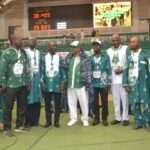A.The Congress is the supreme body of the Party, composed as follows:
- The members of the National Executive Committee;
- The members of the National Advisory Cell;
- The members of the “Shadow Cabinet” (Conv. B’da, 26-28.05, 2006);
- The members of the Provincial Executive Committees (Conv. Bfsm, 29-31.07.93);
- The Coordinators and Departmental Secretaries (Conv. Bfsm, 29-31.07.93);
- The Presidents, Secretaries, Treasurers, and Organizing Secretaries of the Constituency Executive Committees (Conv. Bfsm, 29-31.07.93);
- Two (2) elected delegates from each Electoral Constituency (Conv. Bfsm, 29-31.07.93);
- Two (2) members co-opted by the General Secretariat for each District where Party structures are not yet established (Conv. Bfsm, 29-31.07.93);
- Mayors who are members of the Party (Conv. Buéa, 11-15.12.96);
- Members of the Regional Councils who are members of the Party;
- Members of Parliament who are members of the Party;
- Senators who are members of the Party;
- The President of the Republic, the Vice-President, or the Prime Minister, where applicable, if they are members of the Party;
- Ministers and Special Advisers to the President of the Republic who are members of the Party.
B.Congress Sessions
- The Congress is held once every four (4) years at the date and place set by the National Executive Committee, during which the members of the National Executive Committee are elected (B’da conv. 11-14, 10.2012).
- Notwithstanding the above provisions, in order to nominate a candidate for the Presidential Election, the Congress is held in the year in which the Presidential Election takes place (Conv. Buéa, 11-15.12.96).
- The Congress may meet in an Extraordinary session at the request of the Advisory Cell, in case of referral within the framework of Article 11.5, or at the request of at least two-thirds (2/3) of the Provincial Executive Committees in Cameroon (Conv. Y’de; 16-20.04.99);
- An Extraordinary Congress meets only to discuss matters specified in the act convening it.
C.Quorum
- The quorum required for the Congress to be held is two-thirds (2/3) of all the delegates, provided that at least two-thirds (2/3) of all regions are represented;
- Its decisions are final and binding on all Party organs and members;
- Voting at the Congress is conducted as prescribed by the Congress' internal rules, provided that each delegate is entitled to only one vote;
- Administrative staff present at the Congress do not have the right to vote;
Proxy voting is prohibited at the Congress. Proxy voting in other cases is only allowed in accordance with the Party’s internal regulations.
D.Powers and Functions of the Congress
The supreme power of the Party rests with the Congress, to the exclusion of all other organs, and the Congress is the only body authorized to make decisions regarding the Party’s policies and programs applicable nationwide, and to amend the statutes;
The Congress, subject to the provisions of these statutes, has the power to:
- Review the Party's political decisions;
- Elect and remove from office the Party’s national leaders;
- Receive, discuss, and ratify reports from the Party’s Nomination Commission;
- Designate the Party’s candidate for the Presidential election and their running mate, if applicable;
- Request and receive reports from the National Executive Committee and any other Party body or committee and take appropriate decisions on these reports and/or recommendations;
- Create, elect, and/or appoint any commission, office, body, or structure, when necessary and desirable, and assign it any power and function deemed useful (Conv. Bfsm 29-31.07.93);
- Examine the actions, policies, and programs pursued by the Government, as well as the legislation adopted in the country, from time to time, to ensure compliance with the Party’s principles, policies, programs, goals, and objectives, and make recommendations and/or take action as necessary;
- Review measures taken or proposed bills by the central or local government and determine, if necessary, what action the Party might take;
- Ensure the Party fields as many candidates as possible in all elections to have control over the Government;
- Thoroughly review the reports from provincial organs, electoral constituencies, and the Party’s cell structures, and take necessary decisions to protect, promote, and/or consolidate the Party’s gains and interests;
- Raise the necessary funds for the Party’s operation and support;
- Exercise disciplinary control over all Party organs, leaders, and members, and rule on appeals lodged by any Party member or organ;
- Determine the type and quality of members of ad hoc commissions that may be created by the National Executive Committee;
- Revise and/or amend the Party’s statutes when necessary;
- Delegate any of its powers to the National Executive Committee and/or any other body;
- Take any action necessary to promote the Party’s goals and objectives as outlined in these statutes;
- Exercise any other powers and authority conferred upon it by these statutes, the Party's Internal Regulations, and the Congress' Internal Regulations.


